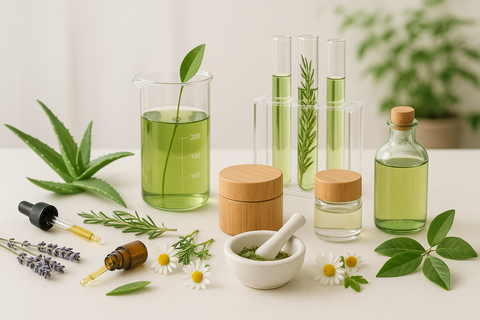Biotech ingredients are becoming important in making eco-conscious cosmetic formulation. They reduce pressure on natural resources and ecosystems. Instead of relying only on botanical ingredients or plant-based ingredients, biotech creates bio-based ingredients through fermentation and cell culture. This method provides consistent sourcing practices and avoids over-harvesting. In addition, cruelty-free formulations and non-toxic ingredients can be developed with fewer resources. Cosmetic formulas keep a clean ingredient profile. They balance being sustainable with good performance.
Sustainability and transparency
Today, people want to see clear information about cosmetic ingredients. They want to see ethical sourcing and sustainable sourcing verification. Eco-friendly packaging helps companies reach their sustainability goals. Recyclable packaging also supports these goals. They also improve trust. Sustainable certifications prove that sustainability claims are true. Examples are NATRUE approval and COSMOS certification. These aspects of sustainability claims help confirm shifts toward sustainability in the market. Transparency directories track transparency values. Examples include lists of sustainable products. They also include satellites.
Formulation strategies for sustainability
Companies start eco-friendly formulas by carefully choosing ingredients. This includes natural and conscious formulas and high-quality ingredients that reduce waste. Ingredient screening helps control changes in ingredient quality and formula stability. Sustainable practices encourage using upcycled ingredients. They also encourage using bio-based and botanical ingredients. Serum formulation projects, like Formulation # V04-004, show how product formulation can meet sustainability goals. This balance between sustainability and performance supports consumer trust and clean beauty market trends.
Market dynamics and growth
The clean beauty market trends highlight the rising demand for sustainability. Ingredient categories essential to this trend support overall market growth. Eco-friendly formulas and a clean ingredient profile make a company's market position stronger. In many important markets, companies must now verify sustainable sourcing and prove their sustainability claims. Moreover, market expansion services track key certifications and packaging practices to ensure industry standards are met. These changes toward sustainability keep reshaping cosmetic formulas. They also change market strategies.
Examples of biotech-derived ingredients
Examples of biotech-derived ingredients include bio-based ingredients made by fermentation. They also include plant-based ingredients from cell culture and upcycled ingredients from food waste. These ingredients support clean ingredient profiles. They offer natural, non-toxic ingredients. Ingredient screening makes sure products meet sustainable certifications. These include COSMOS certification and NATRUE approved personal care ingredients. Biotech methods reduce extraction and support cruelty-free formulations. This strengthens conscious formulations and ensures consistent sourcing practices. Using biotech-derived cosmetic ingredients makes sustainability claims more believable.
Conclusion
To choose sustainable ingredients, companies must disclose ingredients. They must verify sustainable sourcing. They must also ensure ethical sourcing. With consistent sourcing practices, sustainability goals become easier to achieve. Biotech-derived cosmetic ingredients support clean beauty trends. They offer cruelty-free and eco-friendly formulas. Key ingredient categories meet transparency expectations. These include bio-based, botanical, and upcycled ingredients. These shifts toward sustainability continue to shape cosmetic formulas and packaging practices. Please contact us to get started on your sustainable product development journey.
